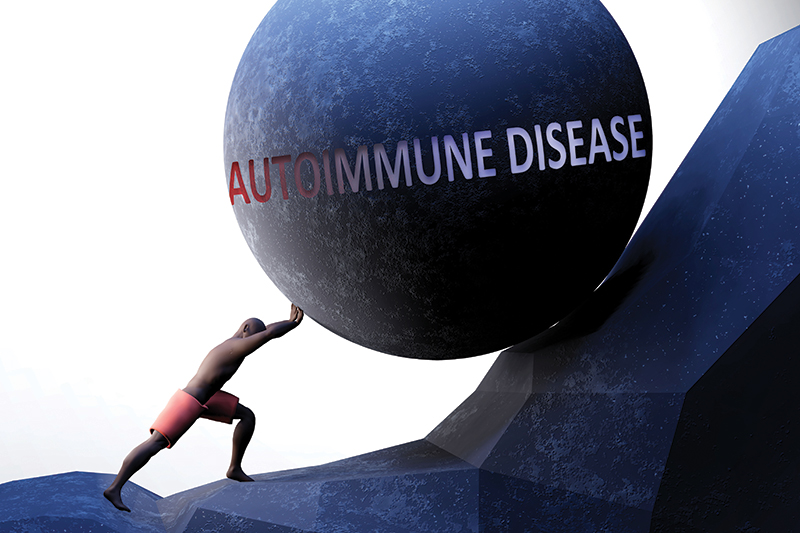Did you know that all autoimmune diseases can be reversed? Did you know that all the symptoms and damage caused by an autoimmune disease can resolve. Unfortunately, disease resolution is not common practice in the United States. Instead, the conventional medicine describes autoimmune diseases as a lifelong condition that can only be managed with steroids, immune suppressants, and supportive care. However, we have the knowledge and tools to resolve these conditions through proper diagnostics and therapeutics.
Autoimmune diseases are an overreaction of the immune system due to an ongoing irritant. Often, that irritant is an infection, toxin, or allergen. This is why immune suppressive treatments like biologics and steroids will commonly reduce symptoms. Thankfully, medicine has used these therapies to save countless lives. But resolution of the disease requires more intervention; identifying the trigger that set off the immune cascade. If the trigger is not identified and removed, autoimmune diseases are known to progress and develop into multiple different autoimmune diseases in various locations and organ systems due to the continued over-reactivity of the immune system.
Example – Hashimoto’s Thyroiditis
This strategy can be used with any autoimmune disease, so let’s apply this to a case of Hashimoto’s thyroiditis. The current standard of care includes monitoring the disease state, management of symptoms, and thyroid medication once the thyroid is no longer functional due to the damage of the immune response. Once this happens, the patient is likely going to rely on thyroid medication for the rest of their life.
After many years of research and clinical success, we have learned the thyroid is very susceptible to certain toxins like medications, mycotoxins from mold exposure, chemical toxins like fluoride and glyphosate found in our food and water, and heavy metal toxins and other pollutants found in our environment. The thyroid is also very sensitive to bacterial and parasitic infections commonly found in the gastrointestinal tract, and viral infections like Epstein–Barr, which can be found directly in the thyroid tissue when biopsied. All these irritants and more can easily be tested in blood, stool, and urine samples. Most patients will even report symptoms at the location where the irritant is manifesting, such as gastrointestinal IBS symptoms, indicating an ongoing dysbiosis or infection.
When the body recognizes the irritant, the immune system responds with a flare of inflammation to reduce the growth of the infection or remove the toxin/allergen. The thyroid can be indirectly impacted by the inflammatory cascade or the victim of a direct attack from the immune system to remove an irritant, which is manifested in the thyroid. Once the irritant is identified and removed, the immune activity reduces, and the thyroid can heal. The major benefit of this root cause approach is that multiple autoimmune diseases can be resolved all at once by addressing the irritant, not the symptoms of inflammation.
The Takeaway
Identifying and addressing the root cause can take time. Therefore, supportive care is recommended until the disease is resolved. Many therapies can reduce the damage from the immune response, improve symptom profile, and increase the normal function of the organ. Outside of immune-suppressive medication, therapies including diet and lifestyle intervention, adequate nutrition, nutraceuticals with anti-inflammatory, antioxidant, and immune modulator properties, as well as off-label use medication like peptides and low-dose Naltrexone can have a profound effect.
Because some autoimmune diseases have resulted in years of inflammatory damage, additional therapeutics can be used to expedite the recovery progress to improve optimal function. Some of the most effective recovery tools are high-dose vitamins and minerals with nutraceuticals or IV therapy and oxygenation tools like ozone therapy or hyperbaric therapy. Autoimmune disease is a resolvable inflammatory condition without the need for continued management with medication. By employing a root cause strategy, we can reduce chronic disease rates and, more importantly, increase quality of life.
Dr. Zach Moran of Roots Natural Medical Center is a board-certified and licensed naturopathic physician and has completed a medical residency program. He has an extensive research background and specializes in chronic infectious disease and environmental toxicity, which he believes to be at the core of most chronic diseases. Roots is a Naturopathic Medicinal Center that focuses on addressing foundational root causes of complex chronic diseases. The clinic aims to properly identify, diagnose, and treat patients with unexplained chronic illnesses. Our services are individualized and patient-focused, as medicine should be.
Visit: rootsmedicalcenter.com, email: info@rootsmedicalcenter.com, or call 860.471.1434 to learn more.
